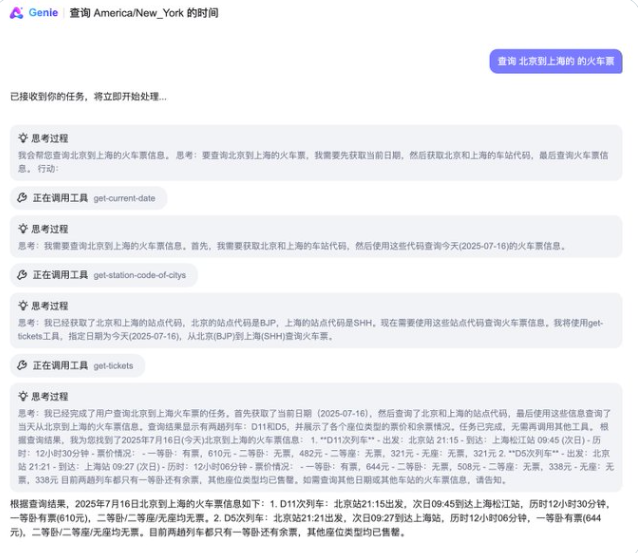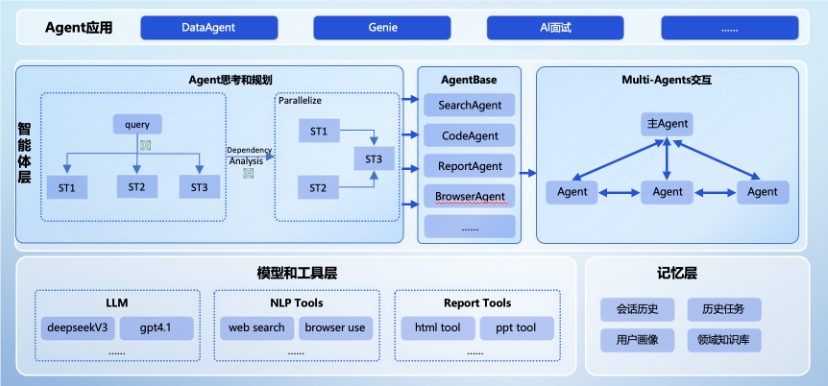Recently, AIbase learned from online information that JD.com has officially open-sourced a product-level end-to-end general multi-agent system called JoyAgent-JDGenie. It surpassed competitors such as OWL and OpenManus in the GAIA benchmark test, achieving an accuracy rate of 75.15% and ranking among the industry's top performers. This open-source framework, with its powerful multi-agent collaboration capabilities and out-of-the-box features, provides developers with a powerful tool for quickly building AI applications.
Leading the GAIA Benchmark, Outstanding Performance
JoyAgent-JDGenie performed impressively in the GAIA benchmark test, setting a new performance record for multi-agent systems with an overall accuracy rate of 75.15%. According to the evaluation criteria of the GAIA benchmark, the system demonstrated excellent capabilities in tasks with varying levels of difficulty: it achieved an accuracy rate of over 85% for Level 1 tasks, nearly 78% for Level 2 tasks, and an impressive 55% for the most complex Level 3 tasks, significantly surpassing other open-source frameworks like OWL (around 65%) and OpenManus (around 65%). AIbase noted that the GAIA benchmark is considered the "gold standard" for evaluating AI agent capabilities due to its emphasis on real-world tasks, such as multimodal processing, tool usage, and complex reasoning. The high score of JoyAgent-JDGenie highlights its strong potential in general scenarios.

End-to-End Multi-Agent Framework, Out-of-the-Box
JoyAgent-JDGenie is a complete end-to-end multi-agent system that allows users to directly obtain answers or solutions through simple queries or task inputs. The framework integrates front-end, back-end, core engine, and multiple sub-agent modules, including report generation agents, code agents, PPT agents, and file agents, covering diverse scenarios such as document processing, code generation, and presentation creation. AIbase learned that developers can further expand functionality by mounting custom sub-agents or external tools (such as Web search APIs or Python interpreters) to meet specific business needs.

Differing from traditional single-agent systems, JoyAgent-JDGenie adopts a multi-layered collaborative design, efficiently handling complex tasks through task decomposition and agent collaboration. For example, when a user inputs "generate a PowerPoint about AI trends in 2025," the system automatically assigns tasks to the PPT agent and data analysis agent, generating a presentation with charts and content. This out-of-the-box feature greatly reduces the development barrier, making it suitable for enterprises to quickly deploy AI applications.
Multimodal and Memory Optimization, Intelligent Advancement
The multimodal and memory design of JoyAgent-JDGenie is one of its core highlights. The system supports various input and output forms, such as text, images, and code, and can handle multimodal tasks in the GAIA benchmark, such as parsing PDF files, analyzing image content, or processing audio data. In addition, the framework introduces a cross-task level similar task memory mechanism, allowing the system to optimize the processing efficiency of current tasks based on historical task records. For example, when generating similar reports repeatedly, the system can retrieve historical data, reducing redundant calculations and improving response speed.
According to feedback from the community, JoyAgent-JDGenie performs exceptionally well in handling complex tasks with its multimodal capabilities. For instance, in GAIA Level 3 tasks, the system can accurately answer questions involving the integration of multiple data sources by combining chain-of-thought reasoning with external tools, such as "extract specific information from a painting and historical records." This capability makes it highly applicable in areas such as data analysis, content creation, and automated workflows.
Open Source Ecosystem, Supporting Developer Innovation
The complete open source nature of JoyAgent-JDGenie (under the Apache 2.0 license) offers great flexibility for developers. AIbase learned that the project has made publicly available the full code for the front-end, back-end, framework, engine, and core sub-agents, allowing developers to perform secondary development or deploy directly. The project also provides detailed documentation and quick start guides, supporting operation on multiple platforms such as Windows and Linux, and is compatible with mainstream hardware environments.
Community feedback indicates that the modular design of JoyAgent-JDGenie facilitates expansion. For example, developers can quickly customize the system by adding new sub-agents, such as agents specialized in financial analysis or medical data processing. Additionally, the JD team stated that they will continue to optimize the framework, planning to introduce local LLM support and more efficient inference acceleration technologies to reduce dependency on cloud APIs, further enhancing performance and cost-effectiveness.
The Future Direction of Multi-Agent Systems
The release of JoyAgent-JDGenie marks a significant breakthrough in the open-source field of multi-agent systems. Its leading performance in the GAIA benchmark not only reflects JD's deep accumulation in AI technology but also provides a model for the rapid deployment of enterprise-level AI applications. AIbase believes that as multi-agent systems continue to improve in task collaboration, tool integration, and multimodal processing capabilities, frameworks like JoyAgent-JDGenie will become important forces in promoting the popularization of AI.
For developers interested in trying JoyAgent-JDGenie, all they need to do is visit its GitHub repository to obtain the source code and configure the environment according to the instructions to quickly deploy it. Whether building intelligent customer service, automated report generation, or complex data analysis tools, this framework is worth trying.
Project Address: https://github.com/jd-opensource/joyagent-jdgenie
